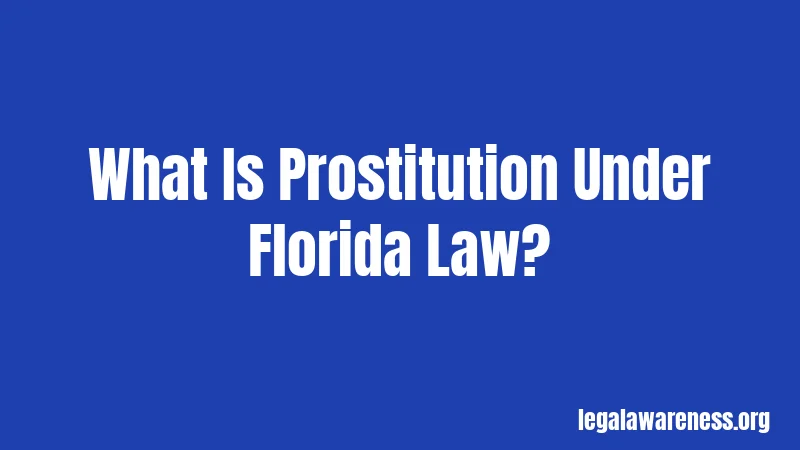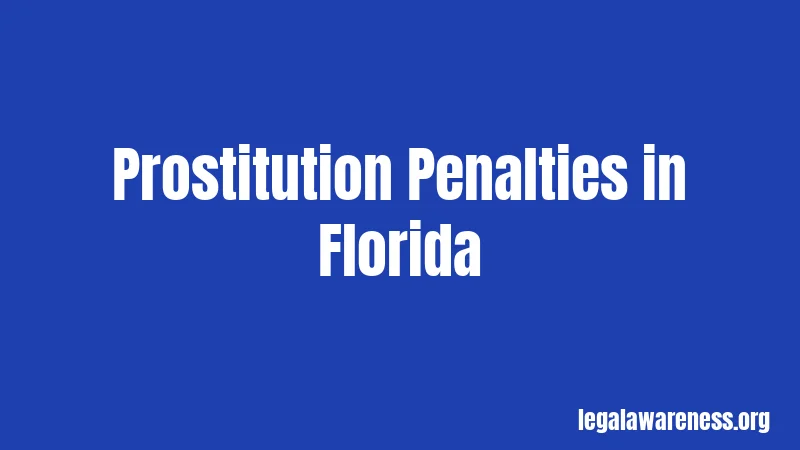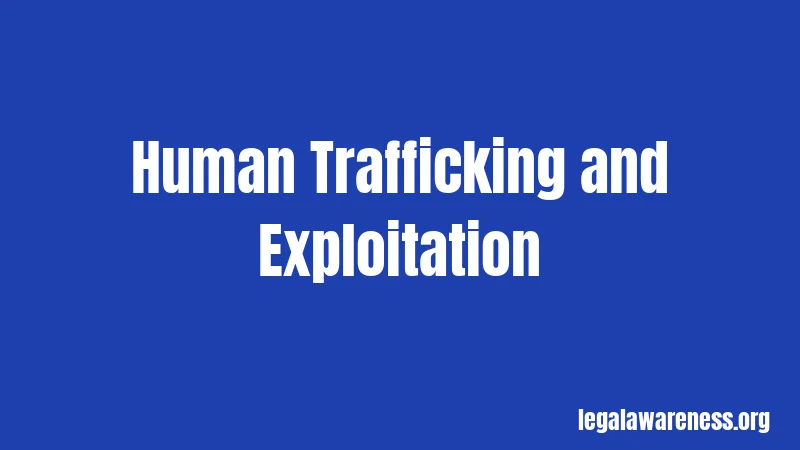Florida Prostitution Laws in 2026: What You Need to Know
Florida has strict laws against prostitution. Seriously strict. A lot of people don’t realize how serious these charges are until they’re facing consequences. Understanding these laws could save you from major legal trouble.
Here’s the thing: prostitution charges aren’t just about embarrassment. They create criminal records that affect employment, housing, and your future. Whether you’re curious about the laws or facing potential charges, you need accurate information. Let’s break down exactly what Florida law says about prostitution.
What Is Prostitution Under Florida Law?

Prostitution in Florida means exchanging sexual acts for money or anything of value. It doesn’t matter if the money changes hands. It doesn’t matter if the act is completed. The agreement itself is illegal.
This includes traditional prostitution. It also includes escort services if sexual acts are involved. It covers online solicitation. It covers transactions arranged through apps or websites.
Florida law casts a wide net. The law covers both the person selling and the person buying. Both parties commit crimes. Both face penalties.
Basic Prostitution Charges in Florida
Soliciting or Engaging in Prostitution
Under Florida Statute 796.07, offering, consenting to, or engaging in prostitution is illegal. This means you can’t accept money for sexual acts. You can’t offer sexual acts for money.
The actual exchange doesn’t need to happen. Simply agreeing to exchange sexual acts for money is a crime. Meeting someone with the intention to exchange money for sex is a crime.
Okay, this is important. The person buying and the person selling both commit crimes. Florida doesn’t look the other way for clients. Both parties face prosecution.
First-time offenses are typically charged as a misdemeanor. You could face up to 60 days in jail. You could get fines up to $500. You also get a criminal record.
Soliciting Prostitution
If you’re the client seeking sexual services, you’re committing solicitation. Solicitation is illegal even if you don’t actually hire someone. Even exchanging messages about sexual services for payment can be solicitation.
Law enforcement uses undercover operations. Police officers pose as prostitutes. They arrest people who agree to pay for sexual acts.
Solicitation charges carry serious penalties. You face misdemeanor or felony charges depending on circumstances. You could spend time in jail. You’ll definitely get a criminal record.
The criminal record follows you everywhere. Employers see it. Housing providers see it. It affects your entire life.
Prostitution Penalties in Florida

First-Time Offenses
First-time prostitution offenses are usually charged as misdemeanors. You face up to 60 days in jail. Fines can reach $500. You’ll get a criminal record that shows up on background checks.
You also face court costs and attorney fees. If you can’t afford an attorney, the court appoints one. You still pay court costs.
A conviction requires you to have an HIV test. The state actually mandates testing as part of the sentence. This is meant to promote public health awareness.
You must register with the local police department. This registration requirement can last for a period of time. It serves as community notification.
Repeat Offenses
If you have a prior prostitution conviction, penalties increase. A second offense within five years becomes a felony. You face up to five years in prison. Fines reach $5,000.
Repeat offenses carry mandatory prison time. You can’t just pay a fine and go home. You’re going to spend time behind bars.
Three or more offenses within ten years is a felony. You face up to ten years in prison. This is serious prison time. Fines jump to $10,000.
Additional Consequences
Beyond jail and fines, prostitution convictions carry other penalties. You must register as an offender in some cases. You face immigration consequences if you’re not a U.S. citizen.
Professional licenses can be revoked. If you’re a teacher, nurse, or hold certain licenses, conviction means losing your license. Your career could be over.
You lose housing options. Many landlords won’t rent to people with prostitution convictions. Getting an apartment becomes much harder.
Employment becomes difficult. Many employers won’t hire people with prostitution charges. Background checks will show the conviction.
The conviction stays on your record. You can petition for removal after certain time periods, but it’s not automatic. You’re stuck with this for years.
Pimping and Pandering Laws in Florida
What Is Pimping?
Pimping in Florida means living off the earnings of a prostitute. You don’t have to force anyone. You don’t need to use violence. Simply profiting from someone else’s prostitution is pimping.
If you receive money that a sex worker earned, you might be guilty of pimping. You don’t need to control them. You don’t need to take all their earnings. Any financial benefit makes you liable.
Pimping is always charged as a felony in Florida. First offense gets you two to fifteen years in prison. Fines can reach $10,000.
Repeat offenses carry fifteen to thirty years in prison. This is serious prison time. Judges often impose sentences on the higher end.
What Is Pandering?
Pandering means procuring someone for prostitution. This includes recruiting, inducing, or encouraging someone to become a prostitute. It includes advertising someone’s sexual services.
Pandering covers a lot of behavior. Running a website advertising escort services is pandering. Recruiting friends or acquaintances for sex work is pandering. Advertising someone on social media is pandering.
Pandering is charged as a felony. First offense gets two to fifteen years in prison. Fines reach $10,000.
Multiple offenses carry fifteen to thirty years. You’re looking at serious federal prison time.
Human Trafficking and Exploitation

Florida Human Trafficking Laws
Florida treats human trafficking very seriously. Trafficking for sexual exploitation is charged as a felony. It’s treated worse than simple prostitution.
Trafficking involves force, fraud, or coercion. This includes physical force. It includes threats. It includes manipulation and deception.
Trafficking doesn’t require crossing state lines in Florida law. It can happen entirely within the state. The penalties are severe.
Trafficking is charged as a felony. You face fifteen to thirty years in prison for first offenses. Fines reach $50,000. This is among the harshest penalties Florida imposes.
Sexual Exploitation
Sexual exploitation of minors is even more serious. If you’re involved in any sexual act with someone under 18, you face felony charges. The penalties are much harsher than adult prostitution.
Anyone engaging in sexual services with a minor faces felony exploitation charges. You face ten to thirty years in prison. Registration as a sex offender is mandatory.
These are serious crimes. The state prosecutes aggressively. Penalties are harsh and long-lasting.
Escort Services and Legal Gray Areas
When Is an Escort Service Legal?
This is where things get tricky. Technically, escort services are legal in Florida. You can pay someone to accompany you to an event. You can pay for their time.
The illegal part is if sexual services are involved. Once money or anything of value exchanges hands in connection with sexual acts, it’s prostitution. The legality ends there.
Many escort websites operate in a gray area. They advertise companionship. They advertise time. If sexual services happen, the entire transaction becomes illegal.
Law enforcement focuses on the sexual services aspect. They collect evidence showing sexual acts were discussed or agreed upon. That’s when charges get filed.
Online Solicitation
Arranging prostitution online is still prostitution. Using apps, websites, or social media doesn’t make it legal. It just makes it easier to document.
Police officers create fake profiles. They pose as escorts or clients. They collect messages and agreements. This evidence is used to file charges.
The messages alone can be enough for prosecution. You don’t need to actually meet. You don’t need to exchange money. The agreement to exchange money for sex is the crime.
Stay with me here. Be careful what you say online. Explicit messages about sexual services for money create criminal evidence. Delete nothing thinking it helps. Prosecutors retrieve deleted messages.
Defenses and Legal Considerations
Possible Defenses to Prostitution Charges
Some defenses exist to prostitution charges. Entrapment is one defense. If a police officer induced you to commit prostitution, you might have a defense.
Entrapment means the officer did more than offer an opportunity. The officer must have persuaded you to commit a crime you wouldn’t otherwise commit.
Insufficient evidence is another defense. Maybe the prosecution can’t prove sexual services were agreed upon. Maybe the evidence is weak.
Identity defense is possible. Maybe you’re not the person who made the agreement. Maybe someone used your identity.
These defenses are difficult to prove. They require skilled attorneys. They require evidence supporting the defense.
Working with an Attorney
Prostitution charges require immediate legal help. Don’t talk to police without an attorney. Don’t answer questions or provide statements.
A good attorney can negotiate with prosecutors. Maybe the charge gets reduced. Maybe a plea bargain reduces penalties.
Your attorney can challenge evidence. Maybe the undercover operation had problems. Maybe statements were obtained illegally.
Finding quality legal representation is crucial. Public defenders handle these cases. Private attorneys might be worth the expense depending on circumstances.
Recent Changes to Florida Prostitution Laws
2024 and 2025 Updates
Florida strengthened human trafficking penalties in recent years. The state also increased penalties for trafficking minors. Prosecutors now aggressively pursue trafficking cases.
Florida expanded definitions of exploitation. Coercion and manipulation are now clearer in the statute. This makes prosecution easier in many cases.
The state increased funding for law enforcement efforts against prostitution. Police departments have more resources for undercover operations. Enforcement is increasing.
Coming Changes and Trends
Florida continues toughening prostitution and trafficking laws. Expect stricter enforcement in major cities. Expect increased penalties for repeat offenses.
The state is focusing more on trafficking victims. Some reforms distinguish between trafficked individuals and independent sex workers. This is still developing.
Online enforcement is increasing. Police departments are dedicating more resources to apps and websites. Messages and online agreements are priorities.
How Prostitution Arrests Happen in Florida
Undercover Operations
Police conduct undercover operations against prostitution. Officers pose as customers or service providers. They set up meetings and arrange payments.
These operations happen online and in person. Police create fake profiles on apps and websites. They communicate like clients would communicate.
Officers collect evidence. They record conversations. They take screenshots of messages. They document agreements about money and sexual services.
Once agreement is established, arrest happens. Sometimes during meetings. Sometimes after messages are exchanged.
Sting Operations
Police also conduct sting operations. Multiple officers pose as prostitutes or clients. They target massage businesses, hotels, and known locations.
Sting operations gather information quickly. Officers arrest multiple people at once. This creates serious cases.
The evidence from stings is usually strong. Officers document everything. Recordings and photos create clear proof.
Building a Case
Police document every aspect of the transaction. Messages are crucial evidence. Agreement about money and sexual services must be established.
Recordings of phone calls are common. Officers record conversations discussing rates and services. This proves agreement to prostitution.
Undercover officers might document payment. Sometimes officers accept money as part of building the case. This creates strong evidence of actual prostitution.
Prosecutors use this evidence to file charges. The case builds from initial contact to arrest.
Frequently Asked Questions
Can I be arrested for just talking about prostitution? Yes. Agreeing to exchange money for sexual acts is a crime. Actually exchanging money isn’t required. The agreement itself is the offense.
What if I thought the person was an adult? Age doesn’t matter legally if you’re wrong. Believing someone is an adult isn’t a defense. You’re responsible for knowing the age of anyone you engage with.
Can prostitution charges be removed from my record? Prostitution convictions can be expunged after certain time periods. Usually you need to wait five to ten years depending on the offense. You then petition the court. Approval isn’t guaranteed.
What if police didn’t read me my rights? Failure to read Miranda rights doesn’t automatically dismiss charges. But it might prevent certain statements from being used. Talk to an attorney about this specific situation.
Is paying for someone’s time legal if nothing sexual happens? Yes, paying for someone’s companionship without sexual acts is legal. The moment sexual services become part of the agreement, it’s illegal. The intention to provide sexual services for money is the crime.
What happens if I’m a victim of trafficking? Florida has victim protections. Trafficking victims might not face prostitution charges. You might receive services and support. Talk to an attorney or victim advocate.
Can I face federal charges for prostitution? Typical prostitution is a state crime. But trafficking across state lines is federal. Sex trafficking of minors is federal. Federal charges carry harsher penalties than state charges.
Final Thoughts
Florida prostitution laws are serious and strictly enforced. The penalties affect your life for years. A conviction changes employment prospects, housing options, and your reputation.
The biggest takeaway? Prostitution is illegal in Florida. Full stop. The activities are monitored. Police conduct regular undercover operations. The consequences are real.
If you’re facing prostitution charges, get legal help immediately. Don’t speak to police. Don’t post about it online. Talk to an attorney right away. Your rights and freedom depend on it.
Now you know the basics about Florida prostitution laws. Stay informed, stay legal, and remember that these laws are enforced seriously. When in doubt or facing charges, consult a criminal defense attorney. They can protect your rights and help you navigate the system.
References
Florida Statutes Chapter 796 – Prostitution Laws
Florida Department of Law Enforcement – Human Trafficking Resources
National Human Trafficking Hotline – Florida Information
Florida Bar Association – Attorney Referral Service
Legal Aid Society of the Orange County Bar Association
National Center for Missing and Exploited Children – Florida Resources
Florida Department of Children and Families – Victim Services
State Attorney’s Office Resources – Criminal Charges Information
